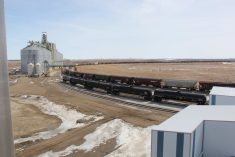A new government-backed fund will help bankroll demonstration-scale projects to make biofuels from sources other than food or feed grains.
Sustainable Development Technology Canada (SDTC) on Wednesday announced it will disburse $500 million in repayable federal government funding for up to 40 per cent of eligible project costs on any “first-of-a-kind” large demonstration-scale facility that produces a “next-generation” renewable fuel in Canada.
Eligible next-generation feedstocks must come from Canadian-grown cellulose biomass, or biomass that could be grown in Canada, such as fast-growing grasses, forest products or “agricultural residues” such as straw.
Read Also

Dryness poised to threaten Saskatchewan crops
Crops in Saskatchewan are developing in opposite directions, the province’s latest crop report said. Growing conditions in the province vary, with some areas receiving enough rain while other locations are experiencing crop stress due to hot, dry conditions.
The fund, called the NextGen Biofuels Fund, will consider applications to support projects that have already been demonstrated at the pilot, pre-commercial scale and use “non-conventional” conversion technologies to produce fuel.
The fund’s contributions to such projects will be repayable based on a free cash flow over a period of 10 years after project completion, SDTC said. (All repayments will have to start before April 2017 and end before April 2027.)
Applicants can submit applications anytime during the year, SDTC said. Among other criteria, SDTC specifies that a project’s total government assistance can’t exceed 60 per cent of eligible costs.
Canada has “an abundance of cellulose-based feedstocks, which have an energy content that is significantly higher than conventional biofuel feedstocks” such as wheat, corn or oilseeds, SDTC said in its release. “Such cellulosic feedstocks consist largely of materials that are currently considered waste, can be grown on low-grade soil and have greater potential for co-products.”
However, SDTC noted, the technologies involved in distilling ethanol and biodiesel from these products “are emerging and therefore have greater technology risk than more established industries.”
Demonstration-scale projects require a high capital expenditure and generally have to rely on debt financing and equity financing, but lenders have a low risk tolerance for technology risk, SDTC said. Early-stage equity financiers in Canada are still primarily geared to conventional energy and mining.
“The international equity markets could be accessible to Canadian companies in the clean-tech space,” SDTC wrote on its web profile of the NextGen Fund. “However, this capital may come at a steep price.”
The NextGen fund is intended to “effectively de-risk clean technologies and prepare them for downstream financing.”
Federal Natural Resources Minister Gary Lunn, in a release, called the federal biofuel strategy “a double win — good for farmers and good for the environment.”


















